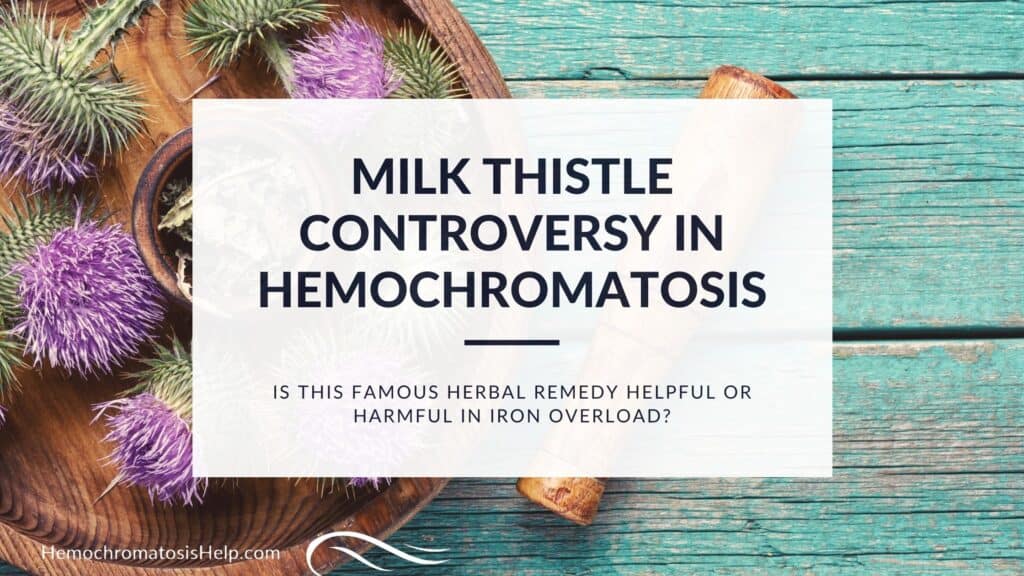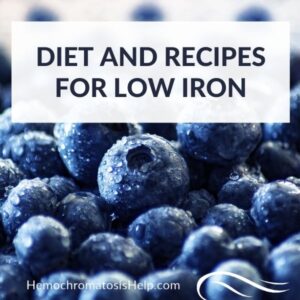Milk thistle and hemochromatosis have a bit of a controversial relationship, with mixed reviews and recommendations from doctors, which I will summarize below.
When I first started to learn about hemochromatosis, the first website I stumbled upon is that of an Australian doctor, Chris Whittington, a medical doctor currently based out of British Columbia.
Her mother and multiple family members were diagnosed with hemochromatosis, and in fact, her mother was one of the first people in the world to have the genetic test (in 1997).
She has written a book called Ironic Health and had a great website with lots of scientific information about HH.
(Note: her website is no longer on the web as of August 2018)
When I first read her site, her statement on milk thistle jumped out at me:
Don’t take milk thistle which has often been touted as good for the liver. It can cause severe problems in those with hemochromatosis. It is best to avoid herbal medicines with hemochromatosis as the joint effects have not been adequately studied.
I was sad to read this, as my training as a naturopathic doctor teaches milk thistle is one of the safest and most effective herbal remedies for promoting liver health in all of botanical medicine.
But I accepted it at first because I have a great deal of respect for all of her other work.
A year or so later, I started to do more research on this particular topic, and what I found was eye-opening.
Dr. Whittington based this conclusion on a single case study of a woman with hemochromatosis.
This 68-year-old patient had elevated liver enzymes and very elevated ferritin (2118), which ultimately led to the diagnosis of hemochromatosis.
This woman also was diagnosed with several other medical conditions, including type 2 diabetes, asthma, hypothyroidism, high blood pressure, and fatty liver.
Also important to note, the patient was in the habit of using 2 Extra Strength Acetaminophen pills every 2 to 3 days and drank soda daily.
She was advised to undergo therapeutic phlebotomy to reduce her iron levels.
On her own, she had been taking one pill (200 mg) of milk thistle to address her liver function. Her doctor suggested she stop the milk thistle, which she declined to do.
After four phlebotomies, her ferritin had dropped from 2118 to 865. This was an exceptionally positive response; however, her liver enzymes had actually increased. Once again, she was advised to discontinue the milk thistle.
At this point, the woman did stop her milk thistle. She also simultaneously stopped both her Extra Strength Acetaminophen and her soda.
Four more phlebotomies later, her ferritin dropped even further down to 141, and her liver enzymes were normal again.
Dr. Whittington’s conclusion was:
This is the first description of a possible exacerbation of clinical and biochemical symptoms of C282Y homozygous hemochromatosis in a patient who ingested milk thistle for more than a year. Patients with C282Y homozygous hemochromatosis should be cautious about ingesting milk thistle in order to improve liver function, as it might have entirely the opposite effect. (Reference)
The net result from this published report is that individuals with hemochromatosis were advised to stay away from milk thistle because it could possibly harm them and their liver function.
I personally avoided milk thistle for at least a year due to this advice.
However, over time, something didn’t click for me. I had seen too many situations where milk thistle improved people’s health, so I decided to re-investigate the matter.
What first caught my attention was to find that this conclusion was based solely upon a single case study. This critical information was not apparent until I researched the situation carefully. The problem is, in science, a conclusion should never be made (good or bad, for or against) upon a single case or one individual.
Secondly, I found the woman discontinued the milk thistle precisely at the same time as she quit her Extra Strength Acetaminophen (a known hepatotoxin, or liver-damaging agent) as well as her soda habit (also detrimental to liver function). This means that three separate variables might have influenced her liver function tests.
It just didn’t add up for me, so I investigated this controversy a bit more. Fairly quickly, I found several rebuttal articles written by medical doctors to the editors of the journal that had published the case study (Canadian Family Physician).
Dr. Robert Kidd, MD, is a physician who treats chronic pain and frequently notes liver enzyme elevation from Acetaminophen. He wrote a very measured and insightful response:
As was clearly stated, the patient also stopped taking “2 extra-strength acetaminophen pills every 2 or 3 days” and “a can of cola every day.” The type of cola was not identified, but it seems likely in an obese patient that the cola would be a diet cola, with aspartame as the sweetener.
Two extra-strength acetaminophen pills (about 1 g) every 2 or 3 days would seem to be an innocuous dose, at least in a healthy individual. And, despite the early fears about aspartame’s hepatotoxicity, there is little strong evidence that it poses a serious risk, at least by itself. In certain individuals, however, toxicity can be experienced at “therapeutic” doses of acetaminophen of less than 4 g/day. And there is some evidence that aspartame can act synergistically with other food additives to produce neurotoxicity.
Because of the coincidental cessation of acetaminophen and (possibly) aspartame in this case, blaming the milk thistle might be premature. (Reference)
Dr. Warren Bell, MD, was more scathing to the Canadian Family Physician Journal. In his response to the cases’ conclusion, he focused upon pointing out the flaws of the logic of the study:
I am astonished that you published the Case Report entitled “Exacerbation of hemochromatosis by ingestion of milk thistle.”
This brief report is actually not about milk thistle at all; it is about the devastating effects of untreated hemochromatosis. In this tale, the ingestion of milk thistle simply amounts to an inconsequential sidebar.
The author notes that her patient’s liver function tests normalized after stopping the milk thistle preparation, coincident with stopping the “moderate amounts of acetaminophen” she was ingesting. Acetaminophen is a known hepatotoxin; I have treated a number of patients in our emergency room for acetaminophen overdose, and our first concern is always hepatic damage.
Moreover, I have had patients on recommended doses of acetaminophen (4 g or less daily) who have shown signs of hepatotoxicity. In someone whose liver is already significantly damaged, the presumption that withdrawal of a known hepatotoxin is irrelevant, whereas the cessation of a known hepatoprotective substance is pivotal, stretches credulity beyond the breaking point.
The biggest problem I have with this article is that it will now go into the melting pot of PubMed citations. There, authors who have an ideological problem with herbal remedies will find it and cite it (unwittingly or otherwise) as “evidence” of yet another “bad” effect of a plant remedy. It might even be used as an excuse by some regulatory agency to ban the use of milk thistle entirely, thus removing one of the few hepatoprotective substances now available to clinicians from the therapeutic stage. (Reference)
I have never seen a rebuttal from Dr. Whittington. I have great respect for Dr. Whittington and appreciate all the great work she has done with hemochromatosis patients.
However, I respectfully have come to a different conclusion than she has regarding the use of milk thistle in hemochromatosis patients.
Read more: Milk Thistle Benefits for Hemochromatosis
Quotes from this article came from the following article on Dr. Whittington’s now former website, which is no longer on the web as of August 2018:
- http://ironic-health.com/articles-of-interest-on-hemochromatosis/treatment-for-hemochromatosis/hemochromatosis-diet/




